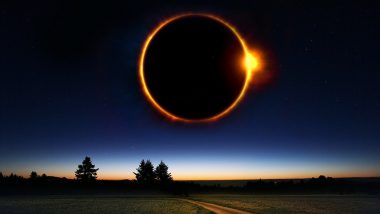The Solar Eclipse, also called Surya Grahan in India, is a rare celestial phenomenon that astronomers, skywatchers and nature lovers look forward to. The last solar eclipse this year, the Surya Grahan 2024, will take place on October 2, however it will not be visible in India. A solar eclipse usually takes place when the moon moves between the sun and the earth and blocks the sunlight, casting a shadow on some parts of the earth. This makes the sun appear either fully covered or partially covered for a short period of time. This creates a visual spectacle with several people gearing up with cameras and high-end equipment to capture footage of the eclipse. However, even though we have advanced as a society and have the latest technologies, the eclipses are associated with superstitions in many cultures around the world. Here are some of the most common ones. Surya Grahan 2024 Date and Sutak Time: When Will Solar Eclipse Take Place in India? Know the Visibility of Annular Solar Eclipse, Viewing Precaution and More.
Common Surya Grahan Superstitious Beliefs
- One common superstitious belief is that food should not be cooked or eaten during Surya Grahan. It is believed that food cooked during this time is unlucky as the negative effects of the solar eclipse fall on the food. In addition, foods like onion, garlic and non-vegetarian items should be avoided. In many parts of India, food is covered in basil leaves during this time to protect it from negative energies. Leftovers are usually eaten before the eclipse begins.
- Another common superstitious belief is to bathe before the eclipse starts and even after it ends. It is believed that the sun’s rays become impure. Hence, it is necessary to cleanse oneself of the negative energies. Some even take bath in the Ganga or sprinkle Gangajal to wash away the negative energies of the eclipse.
- Avoiding sharp objects is another common superstitious belief. It is believed that sharp objects should not be used during a Surya Grahan. This includes cutting nails, hair or using sharp objects like scissors and knives. The belief is that the harmful rays of the sun during a solar eclipse can bring bad luck and may result in injuries or cuts.
- In many traditions and cultures, the solar eclipse is considered an inauspicious time. It is believed that the negative energies during this time affect the environment. This could result in bad luck, accidents, or misfortunes while travelling. It is believed that accidents occur more during this time. Hence, travellers are discouraged from travelling during this time.
- Another common superstitious belief is that pregnant women are the most susceptible to the negative energies of an eclipse. Hence, they should be extra cautious and avoid doing activities like cutting vegetables, stitching, going outside and sitting with their legs crossed. In some cultures, pregnant women are also advised to wear red ribbons or undergarments and keep a safety pin on their stomach. Solar Eclipse and Doomsday Conspiracy Theories: Ancient Myths and Beliefs About The Ring of Fire Celestial Event That Have Links With End of the World.
In many cultures, people chant mantras and prayers during the solar eclipse or Surya Grahan to keep the negative effects at bay. In many countries, the entire house is cleansed thoroughly, and incense or incense sticks are taken to every corner of the house as soon as the eclipse is over, as it is believed that the negative energies during an eclipse, enter the house.
(The above story first appeared on LatestLY on Oct 01, 2024 08:50 AM IST. For more news and updates on politics, world, sports, entertainment and lifestyle, log on to our website latestly.com).













 Quickly
Quickly




















